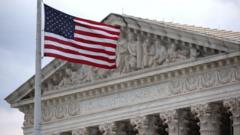The US Supreme Court's 4-4 deadlock has affirmed an Oklahoma State Supreme Court decision, blocking the state's financial support for a Catholic charter school. The outcome highlights ongoing debates over the separation of church and state in education funding.
Supreme Court Halts Funding for Oklahoma's Proposed Religious Charter School

Supreme Court Halts Funding for Oklahoma's Proposed Religious Charter School
A tie ruling by the US Supreme Court prevents Oklahoma from financing the first religious charter school, reinforcing constitutional boundaries on public funds in education.
The US Supreme Court has effectively halted plans for the first taxpayer-funded religious charter school in Oklahoma, resulting from a deadlock in which the justices voted 4-4. This tie, announced on Thursday, upholds a previous ruling by the Oklahoma State Supreme Court that determined the establishment of such a school would contravene the US Constitution. The proposed charter school, backed by the Catholic Archdiocese of Oklahoma City and the Diocese of Tulsa, was set to receive about $23.3 million in state funding over five years.
Charter schools, subsidized by taxpayer dollars but operated independently, have gained traction in America, often seen as a means for parents to exercise greater control over their children's education. However, the Supreme Court's decision does not set a nationwide precedent, leaving the door open for future legal challenges on similar issues. The justices did not disclose how they voted, although ideological divisions appeared evident during a hearing in April, with Justice Amy Coney Barrett recusing herself from the matter without providing an explanation.
Legal experts have been closely monitoring the implications of the case, particularly concerning the First Amendment, which prohibits the government from establishing a religion. Oklahoma Attorney General Gentner Drummond, who has been a vocal opponent of the charter school, welcomed the Supreme Court ruling as a victory for what he termed religious liberty.
Drummond emphasized that public funds should not support radical religious education, while affirming the rights of families to choose educational options for their children. Conversely, representatives for the proposed charter school expressed disappointment, arguing that the ruling represented a form of religious discrimination, asserting their commitment to providing equal educational opportunities incorporating religious teachings.
In light of the ruling, officials for the school indicated they are exploring alternative approaches to offer virtual Catholic education to students across Oklahoma. The decision follows Oklahoma's earlier approval of the charter school, a move that sparked rapid controversy and legal challenges spearheaded by Drummond.
As debates surrounding the role of charter schools and religious education continue to unfold, this case highlights the delicate balance between educational choice and constitutional limitations on public funding for religious institutions in the US.






















